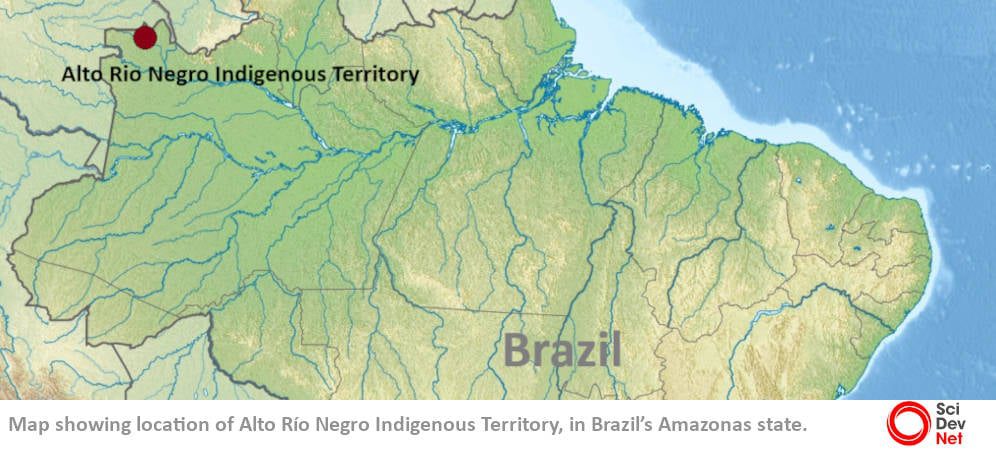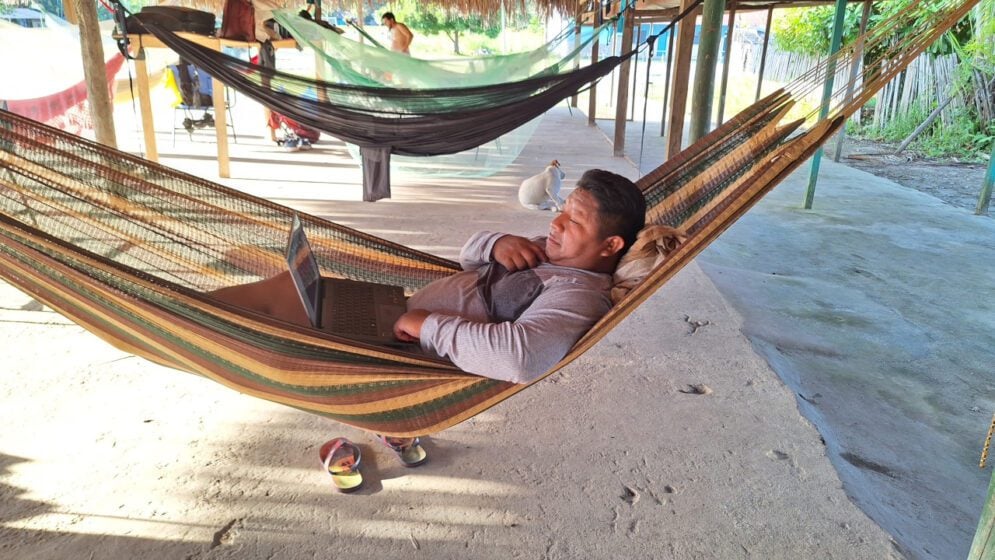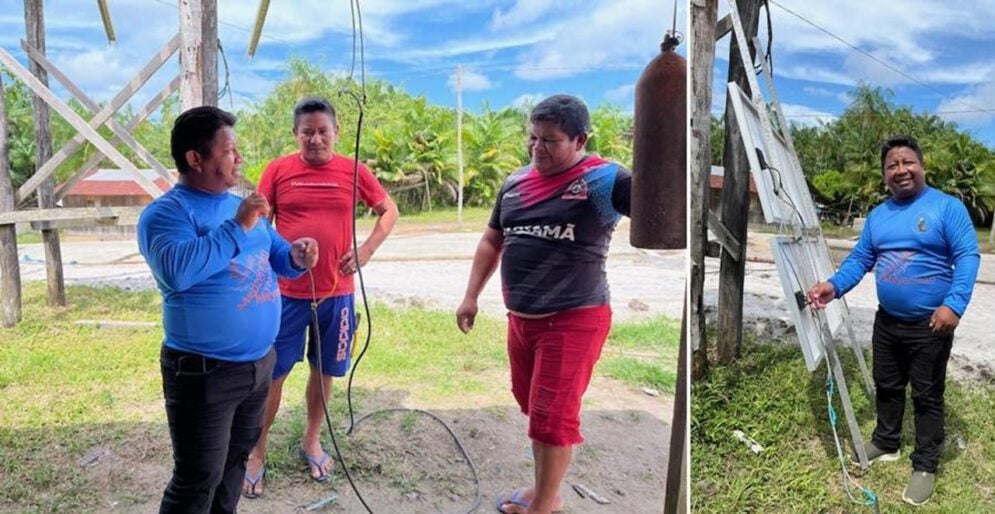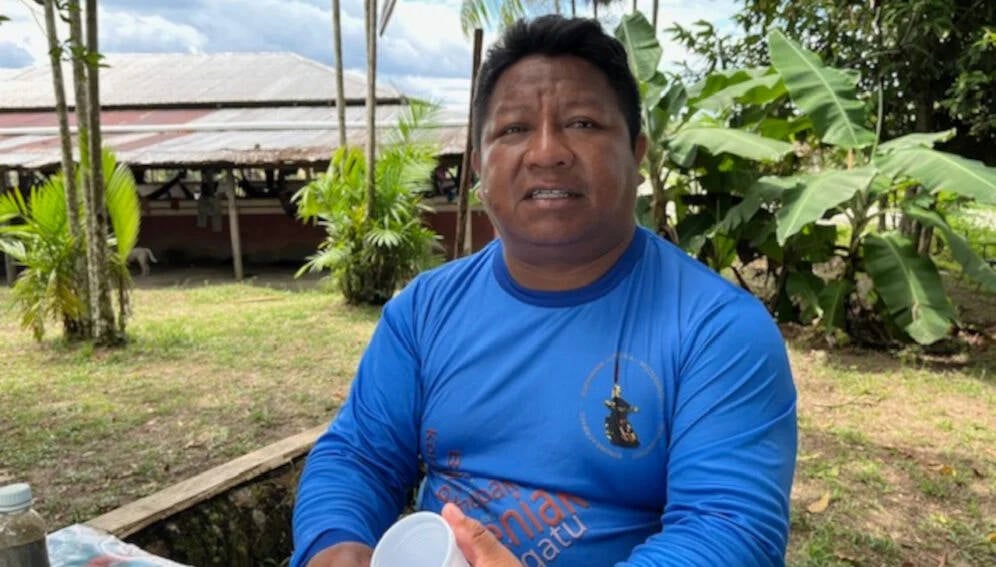[ALDEA ASUNÇÃO, BRAZIL, SciDev.Net] Winning a prestigious scientific prize carries even more weight when you’re an indigenous researcher of illiterate parents.
This was the case for Dzoodzo Baniwa, an indigenous leader born in the Alto Río Negro Indigenous Territory, in Brazil’s Amazonas state, a remote area of the Amazon near the border with Colombia.
Dzoodzo was one of four researchers granted an award by the Bunge Foundation, for studies on the climate emergency, recognising innovative solutions in agricultural sciences.
“For us, both our ancestral knowledge and scientific knowledge are important”
Dzoodzo Baniwa
“My mother and father were illiterate,” Dzoodzo tells SciDev.Net.
“That’s why, in the dedication of my thesis I wrote that what my mother and father thought was an impossible world, I was translating into a possibility for them.”

Map adapted from Wikipedia.org (CC BY-SA 3.0)
Dzoodzo is an activist and key figure in the indigenous education of the Baniwa and Coripaco peoples, promoting the integration of indigenous knowledge in community schools.
He was a primary school pupil at the first Baniwa and Coripaco Pamáali Indigenous School, where he later returned as a teacher and school coordinator. This school was recognised by Brazil’s Ministry of Education in 2016 as a benchmark institution in innovation and creativity in basic education.
Rowed to college
However, getting to college took Dzoodzo a lot of effort and sweat. At that time, he rowed from his village, Santa Isabel – a journey that, by motorboat, takes 20 hours to travel – just to enrol in the intercultural physics course at the Federal Institute of Amazonas (IFAM).
Keep Science Journalism Alive
SciDev.Net provides award-winning science news coverage free of charge. We rely on donations from readers like you to keep going.
Donate to SciDev.Net today
But he did not arrive in time. Dissatisfied, he wrote to the authorities, and he was eventually allowed to begin his studies. He went on to obtain a bachelor’s degree in intercultural physics from IFAM and a master’s degree in environmental sciences teaching from the Federal University of Amazonas.
“If I came home with just a diploma, on paper, it wouldn’t mean much to the community,” he says.
“I wanted to turn my education into something that was more meaningful to the community.”

Dzoodzo Baniwa promotes Indigenous education that creates project-based opportunities without having to leave the territory. Copyright: Yurij Castelfranchi.
Dzoodzo recalls how his ageing mother would go to the stream to wash things and collect drinking water.
“I wanted to facilitate this process so that the water could reach the village,” he explains.
The result was the implementation of a water pumping system using a simple technology: a hydraulic ram, which does not use electricity, but works with a mechanical system using PVC pipes.

Dzoodzo Baniwa helps install solar panels in the indigenous village of Assunção. Copyright: Luisa Massarani / SciDev.Net
According to Dzoodzo, the mechanism can pump about 6,000 litres of water a day for the community.
Despite many Brazilian universities still being geared towards non-indigenous people, for Dzoodzo, his university education was an opportunity to give back to his community.
“Some indigenous people leave their territory and do not return because they believe that there are no opportunities there; I left the territory to study, but I always saw these opportunities from the perspective of the territory,” he says.
The researcher says he feels more valued in his indigenous territory than in the city, where “we end up being seen as different people, and sometimes we are discriminated against”.
“That is why I say that we need to promote an education that generates opportunities based on the projects we develop in the territory, without having to leave our village.”
For Dzoodzo, the greatest current challenge of the Baniwa-Coripaco people is to ensure the continuity of their well-being, the sustainable development of the territory, and necessary knowledge about it.
“Education, science and technology are possible paths for this development model, given the complexities of climate change that affects the territory, with the challenge of building knowledge that also … values ancestral practices,” he says.
To achieve this, he explains, there is a territorial management plan that guides indigenous schools, which, in turn, seek alliances with universities and research institutes. Together, they study sustainable alternatives that can become public policies.
Ancestral knowledge
When asked about how he sees the relationship between indigenous and non-indigenous science, he responds that they are complementary.
“For us, both our ancestral knowledge and scientific knowledge are important,” he says.
“Our knowledge system works well in our territory, but to create an environment of dialogue with the scientific community we also need to adapt to the language of scientific technique, which scientific methodology provides, with all its evidence.”
In addition to the Bunge Foundation award, a book by a team that includes Dzoodzo won the Jabuti Prize, Brazil’s most prestigious literary award, in the category Academic in Biological Sciences and Biodiversity.
The collective book “Bird Species of the Cubate River Region – Indigenous Land of the Upper Rio Negro”, was produced by scientists from the National Institute of Amazonian Research along with indigenous peoples. The book, which contains maps of 310 species of birds, is written in Portuguese and in the indigenous languages Nheengatu and Baniwa.
For Dzoodzo, it shows how indigenous and non-indigenous scientists can combine their knowledge.
Dzoodzo is currently an advisor for indigenous school education at the Municipal Secretariat of Education and Indigenous School Education of São Gabriel da Cachoeira, in the state of Amazonas.
For him, winning the Bunge Foundation award goes beyond recognition for the work he has done with his people for the territory.
“This award shows that the knowledge, the work I have developed, is not only important for my people or my territory, but, above all, it recognises that the work I am doing is also important for Brazil, for contributing to science,” he says.
Dzoodzo stresses that the indigenous community and the scientific community must join forces to seek creative solutions to the challenges posed by climate change. He concludes: “The award precisely shows that need.”
This piece was produced by SciDev.Net’s Latin America and Caribbean desk.
